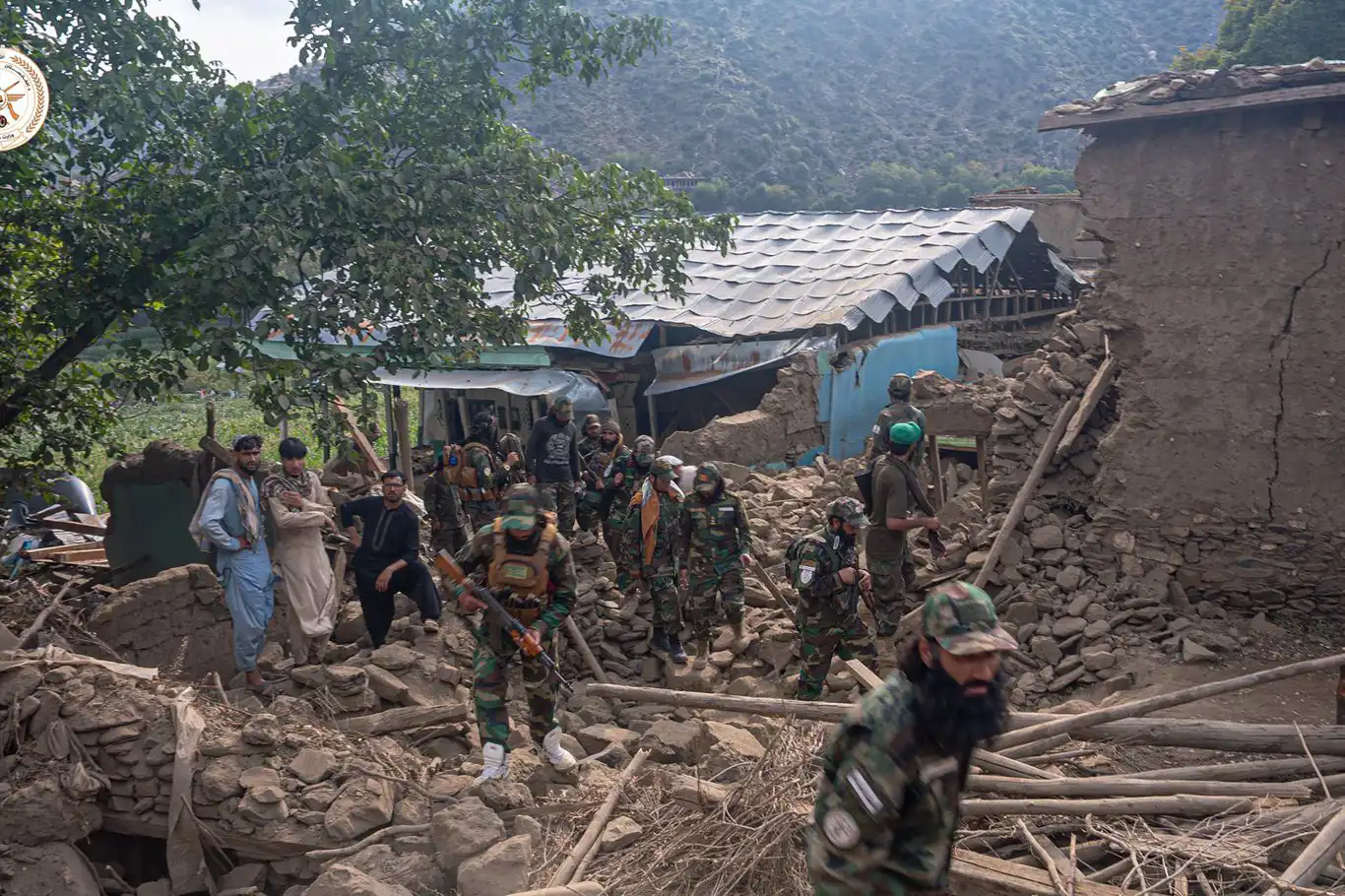Afghan earthquake death toll surges as rescue efforts intensify


Afghanistan is reeling from one of its deadliest natural disasters in decades after a devastating 6.0-magnitude earthquake struck Kunar and neighboring eastern provinces late on August 31.
The disaster has left at least 2,205 people dead and 3,640 others injured, according to Islamic Emirate deputy spokesman Hamdullah Fitrat, as rescue and relief efforts continue under extremely difficult conditions.
The earthquake, centered in Kunar’s Nurgal district, struck just before midnight, its shallow 8-kilometer depth amplifying the devastation. Entire villages were flattened, particularly in Nurgal, Chawkay, Chapa Dara, Watapur, and Asadabad, where homes of mud bricks and wood crumbled instantly.
The scale of destruction is staggering: Islamic Relief reports that 98% of buildings in Kunar province have been damaged or destroyed. More than 5,400 homes collapsed, leaving tens of thousands displaced, many of them now sheltering under tents in open fields despite heavy rains.
At Nangarhar Regional Hospital in Jalalabad, exhausted doctors treat hundreds of wounded, including children who have lost their parents. Supplies are critically short, and patients often lie on the floor as staff struggle to cope with the surge in casualties.
Deputy spokesman Fitrat said: “In the rescue operations of destroyed houses, hundreds of bodies have been recovered so far. Tents have been set up in various areas for the people, and the delivery of aid continues in an organized manner.”
But heavy rains, landslides, and ongoing aftershocks—including a 5.6-magnitude tremor on September 4–5—have blocked roads, buried more survivors under rubble, and forced rescuers to rely on helicopters for access to remote districts.
Some aid has begun to reach Kunar. India has sent 1,000 tents and 15 tons of food, while the United Arab Emirates deployed a search-and-rescue team with medical supplies. The United Kingdom pledged £1 million ($1.3 million), and Iran delivered 80 tons of flour and cooking oil.
Yet humanitarian organizations warn that these contributions fall far short. Afghanistan’s broader humanitarian crisis—worsened by global funding cuts and restrictions on aid operations—has left only 30% of the country’s 2025 humanitarian needs funded, according to the UN.
Dr. Shamshair Khan, working in a UN field clinic in Nurgal, painted a grim picture: “Neither these medicines are enough nor these services. These people need more medicine and tents. They need food and clean drinking water.”
Aid agencies including CARE and Médecins Sans Frontières (MSF) stress the urgent need for safe shelter, clean water, and maternal health services. Women and children face additional barriers due to the lack of female aid workers in conservative rural areas.
The Taliban government has mobilized defense forces, allocated 100 million Afghanis ($1.5 million) for emergency relief, and set up a special committee to coordinate aid. Foreign Minister Amir Khan Muttaqi has instructed Afghan embassies to seek international support.
But with aftershocks still shaking the region, flash floods further complicating access, and entire communities reduced to rubble, relief efforts remain a race against time.
For the people of Kunar and eastern Afghanistan, the earthquake has left wounds that go far beyond physical destruction. Families torn apart, children orphaned, and villages erased from the map testify to a tragedy that will take years—if not generations—to heal.
As Afghans bury their loved ones under open skies, the country’s leaders and aid workers plead for the world’s attention: Afghanistan cannot endure this catastrophe alone. (ILKHA)
LEGAL WARNING: All rights of the published news, photos and videos are reserved by İlke Haber Ajansı Basın Yayın San. Trade A.Ş. Under no circumstances can all or part of the news, photos and videos be used without a written contract or subscription.
The Director-General of the World Health Organization (WHO), Dr. Tedros Adhanom Ghebreyesus, has issued a grave warning about the deepening famine in the Gaza Strip, condemning Israel’s deliberate use of starvation as a weapon of war against the Palestinian people.
Kazakhstan’s National Security Committee (KNB) has seized more than 13 tons of cocaine, marking the largest drug bust in the country’s history.
Egypt has once again voiced its categorical rejection of Israel’s genocidal war and attempts to forcibly displace Palestinians from their homeland, stressing that such a move would amount to the liquidation of the Palestinian cause.
Israeli captive Guy Gilboa-Dalal, held in Gaza for 22 months, has publicly called on the Israeli government to halt its relentless assault on Gaza, warning that the lives of captives and civilians alike are at imminent risk.